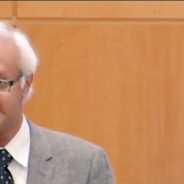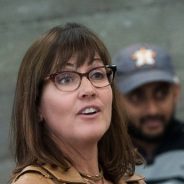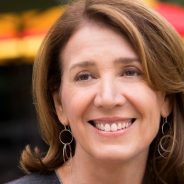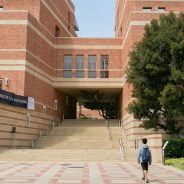Search results for return on investment:
A New Year, A New Dean: NYU Stern Taps Insider to Fill Top Role
There will be a new dean at the helm when the NYU Stern School of Business rings in 2018, but he’s certainly not a newcomer to the school. NYU President Andrew Hamilton and Provost Katherine Fleming today announced that Rangarajan “Raghu” Sundaram, who joined Stern’s faculty more than two decades ago, has been appointed as dean, effective January 1, 2018.
Sundaram, a professor of credit and debt markets as well finance, was selected by Dean Peter Henry in 2016 to join Stern’s leadership team as vice dean for MBA programs. In that role, he has overseen the school’s full-time MBA program; the Langone part-time MBA program; multiple dual-degree programs; and the Executive MBA program, among others. He also helped establish the Creative Destruction Lab, launch the school’s new, specialized one-year MBA programs, and bring business leaders from companies including Amazon, Jigsaw, Microsoft, IBM, and PayPal to join Stern’s newly created Tech MBA Advisory Board.
Sundaram was among several strong candidates for the dean’s post, the school reports. “But in the end, the Search Committee found the best candidate here in our own midst,” President Hamilton said in a statement. “And rightly so. Raghu Sundaram has a strong, highly-regarded record of leadership and innovation, scholarship and teaching, and collegiality and service to both Stern and the university. In a field of distinguished candidates for Stern’s deanship, Raghu stood out.”
As vice dean, Sundaram is also credited with helping extend the school’s New York City–based EMBA program to downtown Washington DC, and shepherding Stern’s entry into online education through the launch of a series of online certificate programs.
As a researcher, Sundaram’s work has focused on agency problems, executive compensation, corporate finance, derivatives pricing, credit risk, and credit derivatives, areas in which he has published extensively. He also has won several awards, including the Jensen Prize and the Stern School’s inaugural Distinguished Teaching Award, and was a finalist for the Brattle Prize and a recipient of research grants from the National Science Foundation and other organizations.
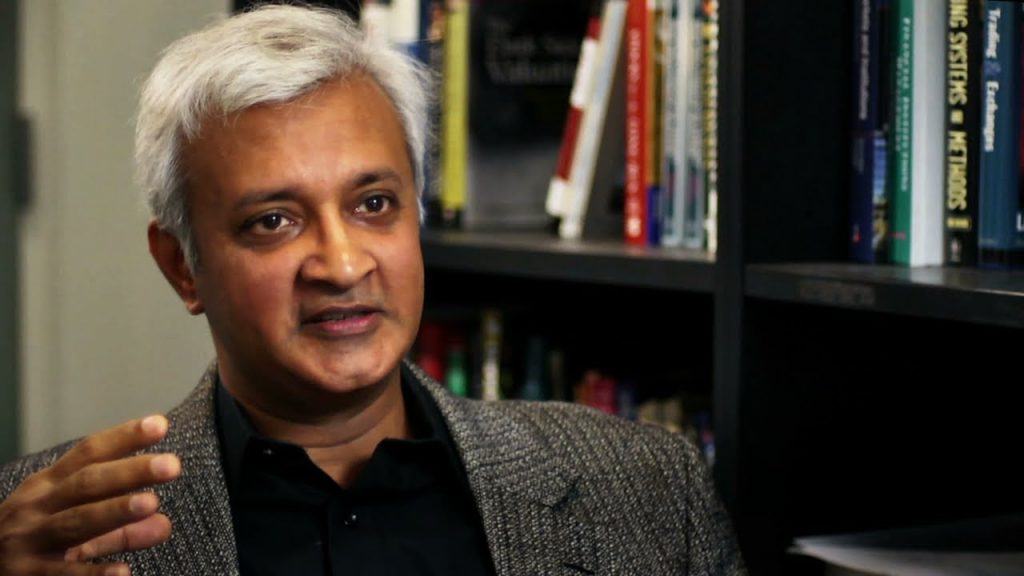
Incoming NYU Stern Dean Rangarajan “Raghu” Sundaram.
The Indian-born Sundaram holds an MBA from Indian Institute of Management, Ahemedabad, as well as both an MA and PhD in economics from Cornell. He taught on the faculty of the University of Rochester for eight years before joining Stern’s faculty in 1996.
Sundaram will replace outgoing Dean Peter Henry, who announced in February of this year his plans to step down and return to full-time scholarship. “At a time when advanced-nation rhetoric and a seeming unwillingness to commit to the reforms needed for growth are at odds with global population trends and an increased need for investment in the developing world, I believe now is the time for me to make further contributions as an economist, advisor and Stern professor,” Henry stated at the time explaining his decision.
Learn more about newly appointed NYU Stern Dean Rangarajan Sundaram.
This article has been edited and republished with permissions from our sister site, Clear Admit.
Two-Year MBA
Johnson Graduate School of Management Two-Year MBA
The Two-Year, full-time MBA program at the Johnson Graduate School of Management at Cornell University is defined by its tight-knit community, one-of-a-kind curriculum, and dual-campus approach. Students are prepared to hit the ground running and stand out among their colleagues—first during their internship and then again as they begin their new career.
Johnson’s full-time Two-Year MBA program features one-of-a-kind curriculum, with fully integrated leadership development components and the opportunity to take advantage of programming offered in partnership with Cornell Tech in New York City.
The first semester of the program is centered around core courses, while the second semester allows students to pursue a particular course of study through an immersion. Students complete a summer internship and complete their remaining year of the program with electives and an optional area of focus.
Curriculum
Johnson’s faculty and lecturers employ a variety of teaching methods, such as case studies, lectures, group projects, team building and leadership activities, and industry treks. MBA classes at Johnson typically begin in late August and end in mid-May, and Commencement occurs shortly thereafter. Johnson works on a semester system, with full-time students completing coursework during the fall and spring terms, and nearly all students go on to complete a summer internship at the end of their first year. Throughout the academic year, Johnson students have short breaks each semester for holidays such as Thanksgiving, with a longer break in between semesters.
Beginning during Orientation and extending throughout the first semester, all first-year students participate in the required Johnson Leading Teams Practicum course. In this course, which is designed to help students develop their leadership skills, MBA entrants work together in small teams of five to six students on problem-solving challenges and core course group projects.
Within the first year of study, Johnson students must complete nine core classes, taking seven in the fall term and completing the remaining two in the spring. The core covers foundational business principles in accounting, marketing, management, operations, strategy, and finance. First-year students must also complete an immersion learning experience in the spring semester by choosing from eight available offerings. Each immersion learning experience includes elective courses, site visits, and case studies that prepare students for post-MBA careers in fields such as strategic marketing, investment banking, and sustainable global enterprise.
In the second year of the MBA program, students can shape their studies by choosing from the school’s more than 80 elective course offerings. Students may further tailor their education to their career interests by pursuing an area of focus from a list of 12 options. Johnson also allows students to take courses at other Cornell University schools and apply them to the MBA degree. Finally, students looking for international exposure can spend a semester studying abroad at one of Johnson’s 30 exchange partner institutions.
Class Profile
The Johnson Two-Year MBA Class of 2024 enrolled 303 students. Students in the class of 2024 had a median GMAT score of 710 and a median GPA of 3.30. The incoming class also had a mean of five and a half years of work experience. Thirty-nine percent of the first year students were women, while 16 percent were underrepresented minorities, which refers to students of African American, Native American, and Hispanic American backgrounds. Domestic students accounted for 57 percent of the class, with the remaining portion of students coming from outside of the United States.
Career Statistics
About 93 percent of Johnson’s Two-Year MBA Class 2020 received job offers. The average starting base salary for Johnson graduates was $138,767, while the mean signing bonus accepted by recently minted Johnson MBAs was $36,391. Thirty-four percent of the Class of 2020 accepted finance positions, including 22 percent pursuing roles in investment banking. Consulting was the second-most popular function and was chosen by 30 percent of the class. Meanwhile, 21 percent of 2020 Johnson MBA graduates moved into management and about 9 percent opted for marketing.
Tuition, Scholarships, and Financial Aid
The tuition for the Johnson full-time MBA is $76,690 per year. However, the school estimates that with additional expenses such as rent and textbooks, students will pay up to $107,622 in that time. To help students finance their studies, Johnson offers a range of merit-based scholarships. Admitted students are automatically considered for certain merit-based awards, and about 30 percent of Johnson students receive related financial support. The most prestigious of scholarships offered to incoming students is the Park Leadership Fellowship, which provides a full-tuition grant for up to 25 entrants who apply for this fellowship.
Johnson is part of The Consortium for Graduate Study in Management, an organization devoted to promoting diversity in business schools. MBA candidates may apply to Johnson through The Consortium, and they are then eligible for full-tuition fellowships. For those applicants who did not receive awards during their first year, there is one scholarship opportunity open to returning students: the Fried Fellowship. There are also a variety of loan options available to Johnson students, including federal loan programs for U.S. citizens and private loans for international students.
Admissions for the Cornell Johnson Two-Year MBA
Applicants can elect to apply to Johnson during one of four admissions rounds, which usually occur in October, November, January, and March. Johnson requires applicants to submit their completed online application along with essays, a resume, GMAT or GRE scores, and transcripts from all collegiate and post-collegiate institutions attended. Applicants must also submit one letter of recommendation and an optional second letter. For applicants whose first language is not English are required to submit TOEFL or IELTS score. All applicants must pay a $200 non-refundable application fee. After applications are evaluated, the admissions committee conducts interviews on an invitation-only basis. Interviews may take place on campus with a current second-year MBA student or member of the admissions committee, while those applicants who cannot travel to Ithaca can complete an interview via Skype.
Application Checklist:
• Completed online application form
• Resume
• List of activities
• Goals Statement and one required essay (a second essay is optional)
• Academic records and transcripts for all post-secondary coursework and degrees*
• GMAT or GRE score report (test waiver optional)*
• TOEFL or IELTS score report (for applicants whose first language is not English)*
• One letter of professional recommendation (a second letter is optional)
• Non-refundable $200 USD application fee
*You may submit unofficial copies of your transcripts and test scores for your application; however, if you are admitted and enroll, you will be required to submit official copies of these documents by the required deadline. Offers of admission are not binding until we verify your official academic records and test scores.
2022-2023 Cornell Johnson Two-Year MBA Deadlines
Round 1: September 22, 2022
Round 2: January 10, 2023
Round 3: April 11, 2023
Get an MBA Admissions Edge with the LiveWire Data Dashboard
Curious about your chances of gaining admission to top business schools? Now you can see how hundreds of previous applicants fared at SC Johnson in just a few clicks. The LiveWire Data Dashboard’s interactive data visualization tools allow you to spot trends, compare MBA programs, and benchmark your stats against successful applicants at your target schools. Learn more here! Ready to explore the data? Purchase a 30-Day or 365-Day subscription in our shop for immediate access!
The Life and Career of Edwin G. Booz and James L. Allen – Booz Allen Hamilton
Booz Allen Hamilton is one of the world’s largest and most recognizable management consulting firms. Headquartered in McLean, Virginia in the Washington DC metro, the firm boasts 24,225 employees working in more than 80 offices around the globe.
The firm has gone through several name changes in its 100 years of existence, including: Edwin G. Booz, Business Engineering Service; Edwin G. Booz Surveys; Edwin G. Booz and Fry Surveys; Booz, Fry, Allen & Hamilton; Booz, Allen & Hamilton; and finally Booz Allen Hamilton. Today, we’ll focus on two of those names, and the men behind them: Edwin G. Booz and James L. Allen, both Northwestern University Kellogg School of Management graduates.
Early Upbringing and Education
Born in Reading, PA in 1887, Edwin George Booz obtained his Bachelor’s degree in economics in 1912 and his Master’s degree in psychology in 1914 from the Kellogg School of Management. After earning his Master’s, Booz founded Booz Allen Hamilton in 1914 in Chicago, originally under the name The Business Research Service.
However, he was drafted into the Army as a private due to World War I in September 1917, and rose to the rank of major. He worked with the War Department in Washington DC to reorganize the business methods of its various bureaus.
Booz left the Army in March 1919 and returned to his business, servicing bankers, manufacturers, advertising agencies, wholesalers, sales managers, publishers, real estate operators, and other enterprises. He would go on to lead the firm as its chairman until 1946, and continued to work part-time for clients and to mentor the next generation of leaders until his death in 1951.
Meanwhile, James L. Allen was born November 21, 1904, in Somerset, Kentucky. He was raised on a farm, educated in public schools, and graduated from Somerset High School in 1921. In 1922, he left the small town for Chicago where he worked at several jobs and attended night school. Allen graduated in 1929 with a B.S. degree in Economics from the Kellogg School of Management.
After graduating, Allen joined Booz’s firm, Edwin G. Booz Surveys, in 1929. He was named a partner in 1936, and focused on developing business strategy, personnel, and organization studies. In the early ’40s, Allen and Booz worked for the U.S. Military leading up to World War II.
Allen was named chairman of Booz Allen Hamilton in 1946, and held that position until 1970. During this time, the firm enjoyed steady growth as it increased its number of partners, staff, and locations. He was named honorary chairman in 1970 and remained involved with Booz Allen Hamilton until his death in 1992.
CHECK THIS OUT: How Chicago Business Schools are Helping Low-Income Students
About the Company
Booz Allen first went public in 1970 with an initial offering of 500,000 shares at $24 per share. In 1976 public trading ceased after Booz Allen’s partners bought back stock in the largest-ever leveraged buyout involving a consulting firm. Years later, in 2007, managing director Marc Gerencser explained that being privately held allowed the firm to consider long-range investments that companies beholden to shareholders might not be able to make.
In June 2012, Booz Allen expanded its operations in North Africa and the Middle East, bringing offices to countries like Kuwait, Oman, Qatar, and the United Arab Emirates. Booz Allen specifically helped the Government of the United Arab Emirates a sort of National Security Agency for that country. The New York Times reported that the company “profits handsomely from its worldwide expansion.”
In 2014, Booz Allen Hamilton Holding Corporation was awarded a “Top 2014 Workplace” by the Washington Post.
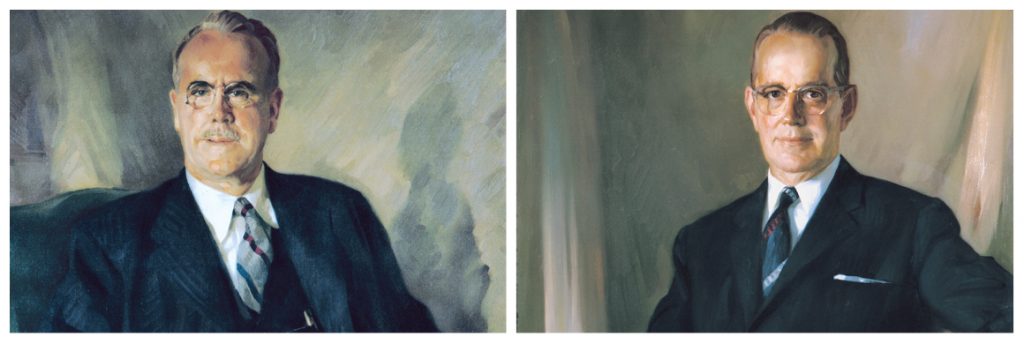
Legacy
Edwin Booz’s name is immortalized as the only name to remain with the firm from its humble beginnings through today. He believed that he could help companies prosper by bringing them “a human touch” and insisted that “people, not products” were the focus of work. This approach gave birth to the modern management consulting profession.
Meanwhile, Jim Allen’s legacy lives on at the Kellogg School of Business at the James L. Allen Center. According to Kellogg, the Center hosts more than 6000 executives each year for one or more of the school’s 160 executive education programs. Considered “an academic retreat,” the Allen Centers offers living and learning spaces to the Kellogg community. Technologically enabled classrooms and comfortable gathering and group study spaces facilitate peer learning and informal interactions among faculty and participants. Additional amenities include indoor workout areas and outdoor exercise programs along the Lake Michigan shoreline provide opportunities for the occasional (and necessary) break and breather.
Stevens Alum Takes Disruptive FinTech Lessons Back Home to Brazil
ZeroBeta founder Rodrigo Silva Cosme, a MS ’16 Stevens Institute of Technology’s School of Business graduate, recently returned to his alma mater to present his master’s thesis, explaining how machine learning can apply to financial markets.
Cosme, who was invited by Professor Khaldoun Khashanah, explains; “The world is getting more automated, more efficient, more intelligent, and finance is no different. You need complete professionals who know how to code and also can handle the financial side of the business and implement solutions.” Cosme, who arrived in the United States with a “lifetime fascination with financial markets,” believes people who choose to trade by themselves can’t do it optimally.
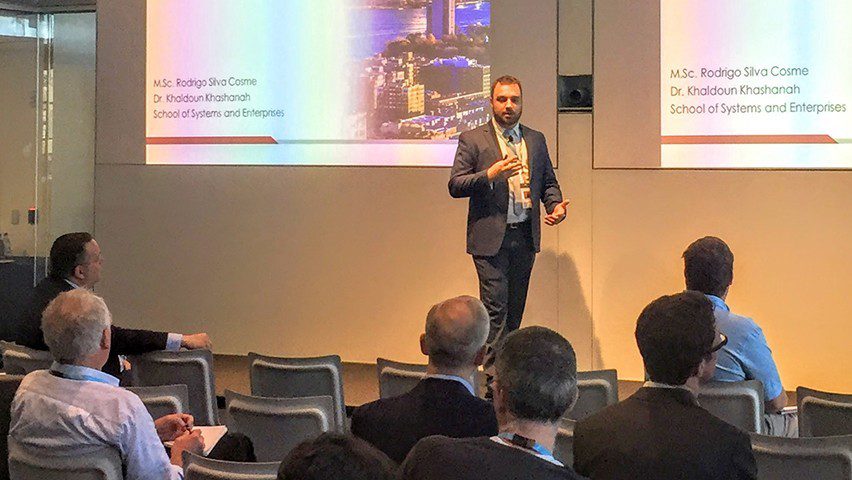
Rodrigo Silva Cosme delivers his thesis at a recent Bloomberg conference at Stevens/Photo via Stevens.
The São Paulo-based ZeroBeta is a unicorn of sorts in the Brazilian market, which “lacks the liquidity that allows for more diversified risk in investment strategies.” The startup leverages algorithmic trading and portfolio optimization techniques to “build smarter strategies for trading.
Cosme continues, saying, “Instead of working for [hedge fund managers], we trade with them—we develop the strategies for the accounts, we make the trading decisions, and they do the commercial side of the business, getting customers and raising capital.”
Cosme attributes ZeroBeta’s success largely to the first-hand exposure he received at Stevens to the myriad ways that finance and technology can intersect. “What I do at my job, every day, is what I learned at Stevens — from trading option spreads, to coding through C++ design patterns, to portfolio rebalancing. If you’re not able to find the answers with the kind of resources Stevens has, you can’t find them anywhere.”
Gain a Global Edge with These Philadelphia International Business MBAs
Every day, it becomes easier and easier to make connections across the world, building a global network of business and resources that can help to benefit the world. Due to an increasingly global economy, possessing a deep knowledge and understanding of the way global markets work can be a crucial part of building a business career. There is almost no limit to the types of opportunities an education in global business will provide: from working in the fields of international trade, global business operations or planning or industrial development, and being employed by international agencies, non-profit organizations, governmental, or both public and private corporations.
According to Michigan State program globalEDGE, “demand continues to grow for individuals who understand the global context of business: from the logistics of international trade and cross-border investments to the cultural and ethical issues that are imbued in the practice of business around the world. By studying international business, you will learn about world cultures and societies, and be challenged to approach issues from different perspectives.”
In choosing to study international business in the Philadelphia metro area, aspiring business leaders can center themselves in a growing market at the center of United States history and global trade. We’ve rounded up some of the area’s top MBA programs that offer a concentration in international business, allowing students to gain specific knowledge and skills to make an impact in the global economy.
Fox School of Business – Temple University
Consistently rated one of the top business schools in the country, the Fox School of Business at Temple University offers students a number of opportunities to gain skills and earn a degree in the field of global business. The Global MBA program, based in Philadelphia, is taught by world renowned faculty and is designed to provide an experiential education in international economics, with live consulting, internship and professional development opportunities. Additional programs like the MBA from Temple University Japan in Tokyo and the EMBA at Temple University Paris offer further opportunities for students to gain a hands-on global experience with a strong business background.
Lerner College – University of Delaware
The MBA at University of Delaware’s Lerner College of Business gives students the opportunity to concentrate in international business, providing the solid business background they will need to effectively conduct business in a global environment. In addition to U.S. citizens looking to expand their knowledge in international business and help their organizations to expand overseas, many students in the Lerner MBA program are international, returning home with a deep understanding of U.S. customs and the ability to navigate business across borders.
YOU MAY ALSO LIKE – Searching for the World’s Top MBA Recruiters: Comcast
Rutgers School of Business, Camden
Students interested in concentrating in International Business and Operations can do so at the Rutgers School of Business by pursuing a number of electives in the field. Students can take a number of electives in the fields of International Business and Operations Management to complete the concentration, including courses like: International Management, Global Operations Information Technology, Global Marketing Strategy, and International Study Abroad in countries such as South Africa, France, and Brazil.
Smeal College of Business – Penn State
While the Smeal College of Business at Penn State does not directly offer a concentration or major in international business, it is an available as an option. At Smeal, options constitute a briefer but still targeted study within a particular area, allowing students to gain a deeper education in Global Business while still receiving the more general education of an MBA.
The Wharton School – University of Pennsylvania
The Wharton School at UPenn, well-known as one of the top business schools in the world, provides students the opportunity to pursue a joint MBA/MA in International Studies. The MBA/MA Lauder Joint-Degree provides students a range of resources and educational experiences in global business, such as the Global Knowledge Lab, which involves students working together as a team to produce a thorough research paper/master’s thesis. The program also includes two short global immersions and an optional ten-day trek called Culture Quest, organized completely by students in the program. The six areas of concentration students may choose to specialize in include: Africa, East and Southeast Asia, Europe, Latin America, South Asia, the Middle East, and North Africa.
New Haas Center Seeks to Tackle Gender, Equity, and Leadership Head On
As one headline after another alleges sexual harassment against women by men in power from Hollywood to Congress, the launch earlier this month UC Berkeley’s Haas School of Business of a new Center for Gender, Equity, and Leadership (CGEL) seems more timely than ever. In fact, the idea for the center significantly predated the current media firestorm—and while its scope will certainly include sexual harassment, it will be significantly wider—addressing issues ranging from the persistent gender pay gap to inadequate maternity leave to the fact that currently only 5.6 percent of CEOs at S&P 500 companies are women.
Since 2014, Kellie McElhaney has been teaching a course at Haas called “The Business Case for Investing in Women.” Regularly over-subscribed, the immensely popular class won McElhaney, an associate adjunct professor at Haas, the Earl F. Cheit Award for Excellence in Teaching. Students in the class were eager for data demonstrating that companies with greater numbers of women in leadership have higher share prices and better returns on equity and investment than companies with fewer women. In fact, so too were companies. And McElhaney delivered.
Together in a 2016 study with Genevieve Smith of the International Center for Research on Women’s advisory practice, McElhaney zeroed in on how Gap Inc. has managed to achieve pay equity at the like-for-like level and equal pay at the organizational level through its company culture, practices, and policies. The relationships that helped spur that research also led the Gap Foundation to become a founding corporate donor of the new center—contributing part of the $1.9 million McElhaney has raised to date, which also includes gifts from alumni and friends. With an ultimate fundraising goal of $10 million, McElhaney hopes CGEL will bring together leaders from many backgrounds to help advance gender and diversity in policy and business, engage male and female allies and people of all ethnicities, races, and classes around a shared goal of gender and diversity, and develop business leaders who view gender as a spectrum rather than a binary construct.
“The idea for the center has been percolating for years,” McElhaney tells Clear Admit. “We had kind of a scatterplot of things happening at Haas before, but no over-arching strategy.” In addition to McElhaney’s own research and teaching, several other Haas professors have been contributing to growing scholarship on gender, equity, and leadership. Professor Laura Tyson’s research and writing has examined how gender equity works around the globe—including how it is associated with better education and health, higher per capita income, faster and more inclusive growth, and greater international competitiveness. Currently faculty director of the Haas Institute for Business & Social Impact, Tyson will form part of the leadership team of CGEL. Professor Laura Kray, who studies gender stereotyping and negotiations, rounds out the inaugural CGEL leadership team.
“The first mission of the center will be to serve as a hub for all the things that have already been happening in pockets all over Haas,” says McElhaney. “There are already courses on power, race, gender, equity,” she explains. “In earnest, we thought to ourselves, ‘Let’s look at all that is happening here around these issues. Wouldn’t it be more effective if we could bring it all together, see what we are doing, and see where we might benefit from going long and deep?”
“At Berkeley, you can build anything—but it has to be funded first,” explains McElhaney. Encouraged by Dean Richard Lyons, she set out to raise $1 million by July 2017 as a proof of concept. In June, CGEL had garnered $1.2 million in funds. In addition to corporate funding from Gap, McElhaney also wooed significant gifts from several high-net-worth individuals through a series of strategic luncheons focused on looking at the world vis-à-vis gender equity. “A dozen individuals gave money right away, and now we’re heavy into the corporate funding component,” she explains.
Expanded Faculty Research, Policy Impact, Radical Fierce Ally-ship
Beyond continued fundraising, McElhaney intends to start 2018 with content and substance—with CGEL serving as a hub for new in-depth faculty research, corporate collaboration, conferences, training sessions, and the development of new courses related to gender, equity, and leadership. In addition to McElhaney’s own work documenting the business case for gender equity, several other Haas professors have also been engaged in pathbreaking research. For example, Professor Clayton Critcher has studied the multiple negative consequences of concealing one’s sexual orientation at work; CGEL leadership team member Kray’s recent work examines how fixed beliefs about gender roles preserve the status quo; and Professor Jennifer Chatman has helped reveal how political correctness in the workplace reduces uncertainty in relationships, encouraging greater creativity by both men and women.
Another point of focus for CGEL will be on the intersection between policy and business. “We want to bring together political and business leaders to look at the things on the political agenda that are moving us backward and how we prioritize them,” McElhaney says, offering pay data transparency and mandatory maternity leave as two examples. “We need to bring business voices into the political fold.”
Developing “radical fierce allies” will be another key priority for the center, she continues. “Men need to come to the table in terms of being ambassadors, but so, too, do women,” McElhaney stresses. “As a white woman, I am earning 80.5 cents on the dollar compared to my male counterpoints, but if I were an African-American woman, that would be 60 cents.” The center will host strategically curated salons to talk about all of these issues, drawing together women of all races, classes, and gender identities to talk about how all women need to be better allies for one another.
CGEL’s Time Is Now
Dean Lyons notes that center’s launch is well timed. “The majority of CEOs include gender equity among their Top 10 priorities, yet boardrooms and C-suites are not changing quickly enough,” he on the Haas website. “While the commitment to diversity and an inclusive work environment is there, too few have a handle on solutions. Our new center will work toward immediate change in these areas and pave the way for future generations.”
McElhaney agrees. “We have a ton of traction, and the appetite is so high for this,” she says. But not only are they hitting it at the right time, but also at the right place, which is Haas. “We have just the right mix of ingredients that other schools can’t claim,” she says. “While other schools are focusing more on diversity or counting the heads, we are focused comprehensively on inclusion in our classrooms—through our cases, our choice of course speakers, our faculty teaching methodology, and our student culture.”
CGEL’s launch will help ensure that Haas students hear about gender, equity, and leadership in every class. “This is a new center that puts on the map that this is something we care about,” she says. “We graduate 100 leaders every year—and going forward we are going to graduate 100 diversity fluent leaders. I think we are uniquely positioned to become a talisman of all things equity.”
Learn more about Haas’s new Center for Gender, Equity and Leadership.
This article has been edited and republished with permissions from Clear Admit.
Merage School of Business MBA Earns Praise From The Economist
The UC Irvine’s Merage School of Business received some good news after the school was ranked in latest business school rankings of The Economist. The school placed 39th in the nation, 16th among public schools, and 56th in the world. The Los Angeles metro business school also scored well in categories including 29th in Open New Career Opportunities; 17th in alumnus rating of career services; and 13th in salary increase.
Continue reading…
Your Search for Atlanta’s Best Accelerated MBA Programs
Most folks pursuing an accelerated MBA know which industry or area of concentration they want to pursue. They are MBA candidates who want to advance their current careers, not switch them. Others choose the accelerated route because it can be difficult to leave two years of work and salary. Continue reading…
Paul Merage School of Business Full-Time MBA Earns Spot On Forbes’ Best Of List
The Paul Merage School of Business at the University of California, Irvine received some heavy honors from the recently-revealed Forbes list of the “Best Business Schools” in the U.S., which analyzes how much graduates typically earn five years after graduation. This year, the business school ended up 41st on the list overall, with a $47,000 USD five-year expected gain for full-time MBA grads.
Continue reading…
UMD Smith Students Gain New Opportunities Through Snider Center
The Snider Center at the University of Maryland R.H. Smith School of Business opened new opportunities and broadened experience for many Smith School students this summer.
Choosing the Best Business School for Consulting
If you are a prospective MBA applicant looking to business school as a way to enter or accelerate your career in the consulting industry, you are certainly not alone. According to the 2017 Prospective Student Survey conducted by the Graduate Management Admissions Council (GMAC), consulting is once again the most sought-after postgraduate industry, with 33 percent of applicants surveyed citing consulting firms as their destination of choice. The consulting function, too, is a top draw. One in four indicated it as their chosen job function, after just marketing/sales (30 percent) and finance/accounting (28 percent).
With so many MBA graduates vying for roles in the consulting field, one of the best ways to distinguish yourself is by going to one of the business schools best known for training top-notch consultants. Of course, this requires thorough research and a deep knowledge of individual school programs. Lucky for you, Clear Admit has done some of the legwork.
Consulting Continues to Be a Top Draw for MBAs
Finance—and investment banking in particular—took a hit following the financial crash of 2008. And the tech sector has been gaining ground as a top destination for MBA grads. But along the way, the consulting industry has held its own, with MBAs clamoring to work for both towering giants in the field as well as at an increasing number of boutique firms now in the marketplace.
What’s the allure? Part of it is the diverse work. Consultants get to think creatively and solve problems, analyze both the big picture and the details, and work on teams juggling multiple assignments. Top salaries don’t hurt either. Recent MBA graduates taking jobs at firms like McKinsey & Company, Boston Consulting Group (BCG), and Bain & Company—known as ‘the MBB firms’ in industry parlance—reported base salaries in 2017 of between $147,000 to $152,500, with additional signing bonuses of $25,000, according to managementconsulted.com, an online resource for the consulting industry.
Choosing the Best Business School for Consulting
Determining which leading business school will best prepare you for a career in consulting requires looking at a range of factors. A logical place to start is by examining career outcomes at individual schools, both in terms of summer internships and full-time jobs. If possible with the available data, you also want to get a sense of how well a school has done placing career-switchers, namely those without prior consulting experience, in coveted consulting roles, since barriers for entry for these grads are understandably higher than for their counterparts who have already worked in the field.
It can also be instructive to see which of the powerhouse consulting firms donate to which leading business schools. Finally, it helps to understand how a given school goes about teaching its students to be consultants, what role experiential learning plays, whether you can hope to learn directly from superstar professors in the field, and what extracurricular resources are in place to help you land your dream consulting gig.
Consulting at UVA Darden
The University of Virginia’s Darden School of Business sent more of its MBA graduates into consulting than any other U.S. school, with 38 percent of the Class of 2016 pursuing work in the consulting industry and 38 percent choosing a consulting function. By comparison, Harvard Business School (HBS) sent 25 percent of its 2016 graduates into consulting, and Stanford Graduate School of Business sent just 16 percent.
As for the top recruiting companies at Darden, Boston Consulting Group snapped up 18 members of the Class of 2016, followed by McKinsey & Company (14), PwC (13), and Accenture (10).
In terms of pay, the average base salary for a Darden MBA heading into consulting was $135,771 with a signing bonus of $26,927. While this isn’t the highest salary in the industry—it falls a few thousand dollars short of offers reported by students at schools like Kellogg School of Management—it is the highest average salary for all Darden MBAs.
Darden’s Classroom, Curriculum, and Professors
As for how Darden trains its MBAs to enter a career in consulting, the school offers a career track concentration in strategy consulting. This concentration is designed to immerse MBA students into the consulting process by helping them identify and deepen their consulting skill sets.
Darden is also known for its case study method of teaching and learning. This method confronts Darden MBA students with challenging, real-life business situations and teaches them how to analyze each situation to come up with a solution—just as they will be called upon to do in a consulting career. Over the course of MBA students’ two years at Darden, they’ll complete in more than 500 case studies on a variety of topics, industries, and diverse environments.
As for Darden’s faculty, many of the school’s professors have an in-depth knowledge of consulting with a breadth of research dedicated to all facets of the field. For example, Samuel E. Bodily, a professor of business administration, teaches “Decision Analysis” to first-year students and “Management Decision Models” to second-year students while also consulting with many corporations, utilities, and government agencies. And Scott. C. Beardsley, Darden dean since 2015, spent 26 years at McKinsey & Company before joining the school.
Outside the Classroom
Darden is home to the Consulting Club, a student organization designed to support students interested in the consulting industry. The club regularly holds events such as consulting industry panels, networking 101, consulting conferences, case competitions, mock interview sessions, internship preparation workshops, and more. And many large consulting companies are club sponsors, including Deloitte, AT Kearney, Bain & Company, EY, and Accenture.
In addition, there are also a variety of consulting projects for MBAs to participate in. These projects help MBAs learn how to develop business plans, create financial forecasts, and perform marketing analysis. For each project, teams of three to six students will work with corporations, global businesses, or non-profit organizations to provide strategy evaluation and planning services.
INSEAD For Consulting
In terms of sheer numbers, no school sends more students into consulting jobs than INSEAD. According to the school’s latest 2016 MBA employment report, 46 percent of INSEAD MBAs took a job in the consulting sector and 48 percent assumed a consulting function. That’s a whopping 479 students accepting a position as a consultant—almost half of the 999 students who filled out the employment report.
INSEAD’s MBA graduates took jobs with such companies as McKinsey (which hired 125 INSEAD grads in 2016), BCG (67), Bain (48), Strategy& (24), and Accenture (16). And it’s no wonder the major players like INSEAD. Many alumni hold prominent positions such as chairmen, CEO, or senior leader at these same top consulting firms.
As for where these consulting grads work, they’re spread out around the world. More than 100 consulting graduates took jobs in Western Europe, 41 of those in the United Kingdom. Another 83 graduates headed off to consulting offices in Asia Pacific, including 23 each in Singapore and Australia. But the single most attractive country for INSEAD consulting grads was the United Arab Emirates, which drew 42.
INSEAD also features an alliance with the University of Pennsylvania’s Wharton School, allowing INSEAD students to spend one of their five periods studying at the U.S. school. INSEAD has a similar campus exchange with Kellogg as well. These exchanges afford INSEAD students access to those schools’ career management centers as well, which can be especially valuable in terms of making connections to U.S. recruiters for students who are interested in working in consulting in the United States after graduation.
In terms of what its consulting grads command in salary, INSEAD also shows strong numbers, albeit lower than Kellogg and Darden. For 2016, the overall mean salary in consulting was $107,300 USD, the overall median salary was $109,500 USD, and the overall annual median sign-on bonus was $25,000, with 76 percent of salaries coming with a sign-on bonus and 83 percent with a performance bonus around $24,500.
Proud of its success in helping career switchers enter new industries, INSEAD shares data about how many of its graduates heading into consulting started out there and how many used business school to make a pivot. Of those graduates taking jobs in consulting after INSEAD, 67 percent held pre-MBA roles in consulting. But 34 percent of those who were financial services professionals also successfully switched to consulting, as did 56 percent of former technology, media, and telecommunications professionals and 38 percent of former corporate sector professionals.
How Consulting Is Taught at INSEAD
INSEAD’s accelerated 10-month MBA is composed of five, eight-week periods built around core courses and electives and concluding with an exam, essay, and/or project. There is no preferred teaching method at INSEAD; instead, individual professors choose the method they feel is best. However, no matter the teaching style or technique, each class is sure to have lively exchange opportunities and diverse study groups.
In terms of core courses, students will start out their first eight weeks with an “Introduction to Strategy” course and will continue their learning into the next period with “Process & Operations Management.” As for electives, over a dozen courses are offered under the Strategy heading including the “Strategy Lab,” which provides MBA students with a practitioner’s view of how consultants tackle projects.
Who Trains Consultants at INSEAD
There are more than 25 resident strategy professors across INSEAD’s three campuses, as well as around a dozen visiting faculty members. Of these, several are former consultants, bringing experience straight from the trenches at McKinsey, Monitor Group, and Accenture, among other leading firms.
Two INSEAD professors, W. Chan Kim and Renée Mauborgne, authored a best-selling book called Blue Ocean Strategy, which spawned the 2007 launch of the INSEAD Blue Ocean Strategy Institute. The institute offers several programs and electives that support the development of aspiring consultants, including a mini-elective, “Blue Ocean Strategy Simulation,” that lets students apply the trademark Blue Ocean Strategy toward managing a fictional company.
Beyond the Classroom at INSEAD
INSEAD’s accelerated 10-month program can make it hard for some student groups to gel, but despite this obstacle, the INSEAD Consulting Club seems to have an active campus presence. Much like at Darden, the Consulting Club at INSEAD provides resources to help INSEAD students prepare for consulting interviews and careers, including workshops, networking, and recruiting events with consulting firms. It also publishes the INSEAD Consulting Club Handbook, free to Consulting Club members, which offers an overview of the industry, profiles of individual firms, and sample cover letters, résumés, interview tips, and practice case questions.
INSEAD also features regular consulting case competitions, including the A.T. Kearney Global Prize Competition. As many as 15 teams from INSEAD compete against each other, with winners advancing to represent INSEAD in a regional competition against seven other European business schools. The winning European school then battles the winning North American school for the Global Prize.
MBA Alum Spotlight: Wharton Alum and Alphabet CFO Ruth Porat
In March 2015, the New York Times called Ruth Porat one of the most powerful women on Wall Street, and claimed she was poised to “immediately become one of the most powerful women in Silicon Valley” as CFO of Google’s corporate umbrella, Alphabet.
SMU Cox Names Ana Rodriguez Director of Latino Leadership Initiative
Ana Rodriguez, alumna of the Southern Methodist University Cox School of Business in Dallas, Texas, was recently named as the school’s newest Director of the Latino Leadership Initiative.
Metro Jobs Report: Career Advice, Goldman Troubles and More
Let’s dig into the latest job news …
Metro News & Notes: MBA Relevancy, Bad Business and more
Good morning and happy Friday!
Here are a few stories you may have missed from the week that was …
USC Marshall MBA Alum Talks Myanmar Business Opportunities
Sometimes, success is about being at the right place at the right time. That was the case for Paul Wilson, an ’94 IBEAR MBA graduate from the USC Marshall School of Business and the Managing Director of Four Rivers—a Myanmar-based consulting company building businesses in Myanmar, Russia, India, Iraq and the UAE. Using his MBA and military background, Wilson has had the unique opportunity to influence the emerging Myanmar economy. Continue reading…
Admissions Director Q&A: Alex Lawrence Of The UCLA Anderson School of Management
Alex Lawrence, an alumnus of the UCLA Anderson School of Management (MBA ’99), took the helm as the school’s Assistant Dean of MBA Admissions and Financial Aid in August 2012.
Funds Help McCombs MBA Students Pursue Social Impact
With the rising emphasis on social impact in recent years, it has become fairly common for MBA programs to prepare their students not just to do well in business but to also do good in the world, and students are on board with this shift in focus. Based on Net Impact’s 2014 “Business as UNusual” guide to graduate programs, 88 percent of surveyed MBA students reported that learning about social and environmental business is a priority.
At the UT Austin McCombs School of Business, peer-generated funds are supporting MBA students in exploring social impact as a career emphasis, starting during their first-year internship.
The Social Enterprise Fund
The Social Enterprise Fund was created by the full-time MBA Class of 2010 as a legacy gift. Its goal: to support first-year MBA students who are interested in working in social impact career fields such as sustainability, nonprofits and other nontraditional sectors.
As an expansion to the fund, the co-founders developed the McCombs’ Social Impact Internship Fund (SIIF), which provides first-year MBA students with financial support so they can explore internships in nonprofit and social impact organizations. These internships typically pay less than those in technology, consulting and financial services, but SIIF helps to offset some of the difference.
That help was especially welcome to Andrew Whiteman, MBA ‘17, who wanted to choose an internship without money driving his decision. He opted to intern with a clean energy startup in San Francisco where the pay was less, but the opportunity to do good was great.
“I was committed to working for a clean energy company and therefore did not recruit with big consulting firms or banks earlier in the semester,” Whiteman wrote in a blog. “With a cross-country move to one of the most expensive cities in the country, the SIIF stipend helped make sure I stayed above water during the summer.”
And, last year, the fund received a boost from SIIFs co-founders, which decided to increase support for students to make a bigger impact. Their goal was to strengthen McCombs’ emphasis on social impact as well as the recruitment of students to that area of work and study.
In the end, thanks to MBA ’17 students Tim Carreon, Silva Gentchev, Margo Hufstetler Gonzalez and Caitlin Goodrich—who co-founded the fund during the spring 2016 semester—and other McCombs’ alumni and faculty, the fund raised more than $33,000, increasing previous funding by more than 600 percent.
“The SIIF allowed me to explore employment at a company with a social impact mission without having to worry about how I was going to make it work financially,” said Teddy Boeddiker, MBA ’17, who interned with small footprint home company Kasita. “This is something that I believe many MBA students are interested in, but few can afford to accept a low-or no-income internship or job.”
McCombs MBA Students Pursue Social Impact
In a recent school blog entry, McCombs shared the internship experiences of MBA ’17 students Andrew Whiteman, Janet Thomassen, Eric Pressberg and Teddy Boeddiker: four students that benefited from the SIIF.
- Andrew Whiteman, MBA ‘17
Whiteman interned at Stem Inc, an energy startup in San Francisco that pairs intelligent controls with energy storage to increase energy cost savings and protect against changing rates. “Working at Stem was a thrilling experience,” said Whiteman, who worked on pricing solutions for the wholesale electricity markets.
“Electricity market participants often face unpredictable price swings and common hedging strategies can be quite costly,” he said. “My final product was a financial model that quantified the economic value in the marketplace, proposing an alternative solution to current hedging strategies.”
- Janet Thomassen, MBA ‘17
Thomassen took an internship in New York City with the social impact consulting firm, Inspiring Capital, which supports the social enterprise sector by connecting talented business professionals with high-potential and purpose-driven organizations. Her role was to work with Goodwill NY/NJ to assess the financial feasibility of a new document management service.
“The feasibility study led me to urge Goodwill not to pursue this additional business line due to a highly competitive market and unattractive long-term financial returns,” she said. “However, I shared lessons on how to think about the market opportunity, operational competencies, and financial considerations when assessing the viability of a new business line.”
- Eric Pressberg, MBA ‘17
Pressberg chose to intern with an environmental conservation nonprofit in Washington, D.C., the Nature Conservancy. As a summer associate, his role was to work with the conservation finance team to help the new aquaculture—fish farming—department.
“We were developing the strategy, [deciding] how to go about raising funds, the story to tell potential donors, and what type of projects we want to have—things like building a tool to decide if a project was worthy of investment, creating some of the PR documents to communicate with potential investors and donors and then actually designing the specific project, which was based in the Chesapeake Bay,” he shared.
- Teddy Boeddiker, MBA ‘17
Boeddiker stayed in Austin for his internship and worked with a small footprint home startup called Kasita. The company manufactures 320-square-foot homes for more affordable housing options. As an intern, Boeddiker spent his time fine-tuning the pitch deck to help the company gain additional funding.
“I spent most of my effort helping ‘Professor Dumpster’ [Jeff Wilson, CEO and co-founder of Kasita] fine-tune his pitch deck as he sought funding to grow the company,” he said. “He was pitching the company to experienced technical investors who expected more detailed information on financial projections and the market size.”
By offering funding and internship opportunities for their MBA students, McCombs has helped to alleviate some of the financial burden for students interested in social impact, and making it easier than ever to enter this particularly rewarding career area.

